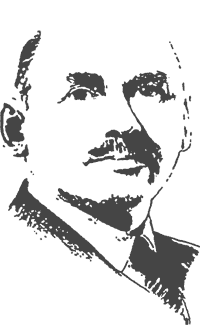Dr. Robert Hutchings Goddard
 Robert Hutchings Goddard was born in Worcester, Massachusetts on October 5, 1882 in his family's house on Maple Hill (One Tallawanda Drive). He graduated from South High School (1904), Worcester Polytechnic Institute (BS, 1908) and Clark University (MS, 1910, PhD, 1911). He was a professor and Chairman of the Physics Department of Clark U. for many years. He died on August 10, 1945 and is buried in the family plot at Hope Cemetery.
Robert Hutchings Goddard was born in Worcester, Massachusetts on October 5, 1882 in his family's house on Maple Hill (One Tallawanda Drive). He graduated from South High School (1904), Worcester Polytechnic Institute (BS, 1908) and Clark University (MS, 1910, PhD, 1911). He was a professor and Chairman of the Physics Department of Clark U. for many years. He died on August 10, 1945 and is buried in the family plot at Hope Cemetery.
Goddard is internationally recognized as the Father of the Modern Rocket. It was his many innovations that made it possible for a rocket to actually leave the earth and enter space. In all, his work led to 214 patents. Because of his pioneering efforts he is credited as the Father of the Space Age.
All of Goddard's early experimentation and construction of the innovative liquid fuel rocket took place in Worcester (1908 1929). He successfully tested his first liquid fuel rocket on March 16, 1926 at his Aunt Effie's (a distant cousin) farm in Auburn. As his rockets became larger and experiments became louder, he was no longer welcome to experiment in the Commonwealth of Massachusetts. For a short while he continued his work at Camp Devens, MA on federal land (1929 1930). Later he spent several years in New Mexico (1930 1941) perfecting his rockets. From 1942 1945 he worked to develop jet assisted airplane flight (JATO) for the military at Annapolis, MD. Among the many honors granted to Goddard after his death are the:
- Congressional Medal (1959) "In recognition of pioneering research in rocket propulsion"
- Langley Medal (1960) for "achievements in aerodromics"
- American Rocket Society (1960) granite marker unveiled at the former Ward Farm (now the Pakachaug Golf Course, Auburn, MA)
- Goddard Space Flight Center, Greenbelt, MD (1961) NASA's first headquarters
- Guggenheim Medal (1964)
- many schools, libraries and other public buildings named after him
Some of Goddard's Historic Firsts
Goddard's basic contribution to rockets, missiles and space flight are remarkable. Despite a lifetime of poor health and the reluctance of many to accept his vision, he followed his dream and persevered in developing the means by which humans have been able to leave the earth and enter space.
The following list is an abbreviated sample of some of Goddard's pioneering inventions and accomplishments. He was the first person to:
- receive patents for a liquid fuel and multi stage rocket (1914)
- prove experimentally that a rocket will provide thrust in a vacuum (1915)
- develop and demonstrate the theory of the bazooka (1918)
- publish a basic mathematical theory, "A Method of Reaching Extreme Altitudes", underlying rocket propulsion and rocket flight (1919)
- develop a rocket motor using liquid propellants (1925)
- build and successfully launch a liquid fuel rocket (1926)
- launch a scientific payload (barometer and camera) in a rocket flight (1929)
- use deflector vanes in the blast of the rocket motor as a method of stabilizing and guiding rockets (1932)
- develop a gyro stabilization apparatus for rockets (1932)
- launch a liquid fuel rocket which attained a speed greater than that of sound (1935)